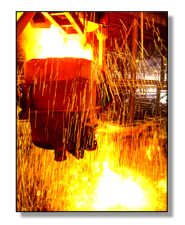NUCOR: EXTREME SYSTEMS SAVVY MANAGEMENT AT ALL LEVELS
/To my eyes, two of the most fascinating sights to behold are hot metal in motion and a group of people in headlong pursuit of a shared purpose. Those images are the essence of Nucor -- Ken Iverson, legendary past President and CEO of Nucor.
Nucor is the largest producer of steel in the United States and North America’s largest recycler. They've never had a layoff at any of their steel mills and have only had three unprofitable quarters (first three quarters of 2009) since their inception in 1966. Nucor is known for the innovative capabilities of its teammates (employees), the quality and value of its steel, and the safety of its facilities. A main section of the Nucor website is devoted to telling their "Story," including describing Nucor's unique culture:
- Safety First
- Eliminating Hierarchy
- Granting Trust and Freedom
- Giving All Workers a Stake in the Company
- Turning Everyone into a Decision Maker
- Inspiring a Work Ethic
- Employee Relations
These components intertwine to provide the strength of their approach. For example, their famous pay for performance model couldn't work if the teams didn't have the power to make decisions related to the performance of their team. Decision-making couldn't work if there were numerous layers of management (there are only four). This is systems savvy management built from the 1960s to today. Innovative steel production is what they do, but they manage the technology in a way that is tightly bound to their organizational practices. They weave together the technology tools, organizational practices, and are very focused on the people in their organization. From their website:
Push decision-making down to the lowest level . . . 'empowerment' has gone beyond a corporate buzzword, and become a way of life at Nucor: From employees who are unafraid to stop production whenever they see a potential problem; to front-line workers who regularly spend time at their customer's facility to get a better idea of how to improve quality; to employees who take it upon themselves to create new and better ways to produce steel.
There are multiple books describing Nucor's approach to business. One of the most famous is Plain Talk: Lessons From a Business Maverick, by the founding CEO, Ken Iverson. Written in 1998, it is full of three decades of examples of systems savvy management. Nucor's strong ability to weave together technology tools, organizational practice, and people is alive and well.
Dan Krug, Director of Human Resources and Organizational Development at Nucor headquarters; Doyle Hopper, General Manager of Nucor's Vulcraft Group and Nucor Cold Finish in Nebraska; and Dirk Petersen, Nucor Steel, Nebraska took the time to tell me about a vivid recent example (Thanks to David Hanson for the intial introduction and background).
In June of 2010 the Norfolk, Nebraska area, home to four Nucor divisions, was struck by horrible flooding. A tragic outcome of this flood was a railroad bridge collapse, killing one of the three Nebraska Central Railroad employees involved in an inspection. The bridge outage diverted the river water, increasing the flooding at one Nucor site and cutting part of the transportation link for raw materials and finished goods at another. In true Nucor style, the plants never stopped moving product and their customers had no delays. Where other local firms sent their employees home and hired contractors to deal with the mess, the Nucor plants stayed open, continued to provide for customer, and put themselves back on-line. A flavor of the Nucor approach from Doyle Hopper:
Who better to do the job than the people who own it? They're in this together. I don't want somebody else [e.g., contractors] in there fighting the battle. We know what the result we’re looking for, and we're prepared.
In the next few posts, I'll tell the Vulcraft flood recovery story and then describe how the Nucor team overcame the critical transportation issue caused by the bridge outage. Both examples highlight an interesting feature of exceptional systems savvy: deep expertise, whether in technology or organizational practice, can make the dimension almost invisible. Think about the difficulty some experts have in describing their work . . . they just do the work naturally and may have a hard time describing the separate steps. These experts make the work itself look easy -- when it's not. The work flows so smoothly due to years of experience. I had this feeling when talking with Doyle and Dirk. Be sure to read between the lines regarding their use of the engineering it took to keep their product flowing to the customers.








